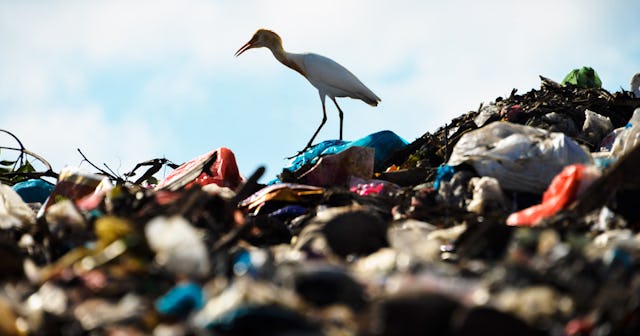1 Millions Species Are At Risk For Extinction -- And It's All Our Fault

Overfishing, climate change, and pollution are all on the list of causes
Nature is declining globally at a terrifying rate, with over one million species risking extinction, warns a new report. The culprit is, unsurprisingly, humans — and the impact could be more severe than anyone could have imagined.
A report issued by the Intergovernmental Science-Policy Platform on Biodiversity and Ecosystem Services (IPBES), which was compiled by 145 expert authors from 50 countries over the past three years, (with input from another 310 contributing authors) is not mincing words: “The health of ecosystems on which we and all other species depend is deteriorating more rapidly than ever. We are eroding the very foundations of our economies, livelihoods, food security, health and quality of life worldwide,” said IPBES Chair, Sir Robert Watson.
This is the first report of its kind issued by the UN and talks in detail about the biodiversity crisis we are facing globally. More food, energy, and materials are being supplied to the world population but nature is the one suffering.
So, what are the main causes of the crisis? The report lists five drivers (in order of impact), including changes in land and sea use (overfishing), direct exploitation of organisms, climate change, pollution, and invasive alien species. With activities like farming, logging, poaching, fishing and mining happening to support our planet’s 7 billion+ population, our world is changing at a rate “unprecedented in human history.”
Reactions to the report have been understandably somber:
“Ecosystems, species, wild populations, local varieties and breeds of domesticated plants and animals are shrinking, deteriorating or vanishing. The essential, interconnected web of life on Earth is getting smaller and increasingly frayed,” said Prof. Settele, a co-author of the report. “This loss is a direct result of human activity and constitutes a direct threat to human well-being in all regions of the world.”
The report states that one million of the planet’s eight million species of plants and animals are at risk of going extinct in the near future. It’s unimaginable to think about not only that level of devastation, but the impacts each species has on others in our ecosystem.“While the planetary garden still exists,” Thomas Lovejoy of George Mason University said about the report, “it is in deep disrepair, frayed and fragmented almost beyond recognition.”
The pace of species loss “is already tens to hundreds of times higher than it has been, on average, over the last 10 million years,” according to the report. “More than 500,000 of the world’s estimated 5.9 million terrestrial species do not have adequate habitats for long term survival without habitat restoration.”
Though the report is ominous, there are changes we can be making to enact positive changes to our environment. “It’s is not too late to make a difference, but only if we start now at every level from local to global,” the report said. “Through ‘transformative change’, nature can still be conserved, restored and used sustainably — this is also key to meeting most other global goals.” Some of these changes include making water distribution more equitable, using ecosystem-based approaches to managing our world’s fisheries, and promoting nature-based solutions like increased access to urban services for low-income communities like access to green spaces.
Bottom line, we need to act now. “Human actions threaten more species with global extinction now than ever before,” the report concludes, with an estimate that “around 1 million species already face extinction, many within decades, unless action is taken.”
“The key to remember is, it’s not a terminal diagnosis,” co-author, Andrew Purvis said. But it only happens if we as a collective global community pull together and heed the warning we’ve been given.